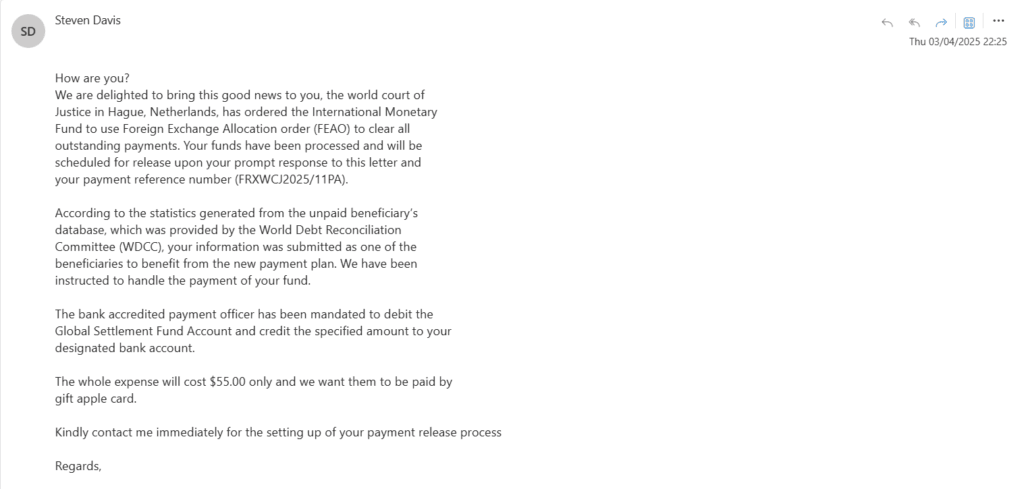Scammers continue to evolve their tactics, using official-sounding names and organizations to lure victims into paying fraudulent fees. One of the latest phishing scams involves an email impersonating an attorney named Steven Davis, claiming that the recipient is entitled to a large sum of money from the International Monetary Fund (IMF) via the Foreign Exchange Allocation Order (FEAO). However, before receiving the funds, the recipient must pay an upfront fee of $55 using an Apple gift card. Below, we expose the scam, analyze its tactics, and provide guidance on how to protect yourself.

The Scam Email Details
From: Steven Davis
Sent: Thursday, April 03, 2025 06:24
Subject: /Payment supervisor
Reply-To: [email protected]
Original Scam Email Content:
How are you?
We are delighted to bring this good news to you, the world court of
Justice in Hague, Netherlands, has ordered the International Monetary
Fund to use Foreign Exchange Allocation order (FEAO) to clear all
outstanding payments. Your funds have been processed and will be
scheduled for release upon your prompt response to this letter and
your payment reference number (FRXWCJ2025/11PA).
According to the statistics generated from the unpaid beneficiary’s
database, which was provided by the World Debt Reconciliation
Committee (WDCC), your information was submitted as one of the
beneficiaries to benefit from the new payment plan. We have been
instructed to handle the payment of your fund.
The bank accredited payment officer has been mandated to debit the
Global Settlement Fund Account and credit the specified amount to your
designated bank account.
The whole expense will cost $55.00 only and we want them to be paid by
gift apple card.
Kindly contact me immediately for the setting up of your payment release process.
Regards,
Steven Davis
Attorney/Payment supervisor
Information Officer.
Breaking Down the Scam
This email contains multiple red flags that indicate it is a scam. Here’s what to watch for:
1. Fake Legal and Financial Terms
Scammers often use official-sounding terms to make their emails appear legitimate. The email mentions:
- “Foreign Exchange Allocation Order (FEAO)” – This is a fabricated term; no such process exists.
- “World Court of Justice in Hague, Netherlands” – There is no court with this exact name that handles individual financial claims.
- “World Debt Reconciliation Committee (WDCC)” – Another fake organization created by scammers.
2. Suspicious Email Address and Reply-To
The email appears to come from Steven Davis, but the reply-to address is [email protected]—a generic Gmail account instead of an official government or financial institution domain.
3. Upfront Fee Requirement
Legitimate financial institutions do not require recipients to pay fees upfront to receive funds. This is a classic advance-fee scam tactic.
4. Unusual Payment Request: Gift Cards
No legitimate organization requests Apple gift cards as a form of payment. Gift cards are a favourite method for scammers because they are untraceable and non-refundable.
5. Lack of Personalization
The email is not addressed to the recipient by name, which indicates that it is a mass phishing attempt.
6. Poor Grammar and Formatting
Official emails from legal and financial institutions do not contain grammatical errors, awkward phrasing, and inconsistent formatting.
Why This Scam Works
Scammers prey on people’s hope of receiving unexpected financial windfalls. They create a sense of urgency, claiming that the recipient must act fast before losing their chance. By requesting gift cards, they ensure that victims cannot reverse the transaction or recover their money.
How to Protect Yourself
- Verify the Sender – Always check the sender’s email address. Legitimate financial organizations do not use Gmail accounts.
- Never Pay to Receive Money – Any request for upfront fees to claim lottery winnings, inheritance, or compensation is a scam.
- Look for Red Flags – Be wary of unofficial payment methods like gift cards and urgent action requests.
- Research the Organization – If an organization claims to exist, search for it online along with terms like “scam” or “fraud” to see if others have reported similar scams.
- Report the Scam – If you receive a similar email, do not respond. Instead, report it to your local fraud agency, the Federal Trade Commission (FTC), or Action Fraud.
Common Variations of This Scam
Scammers frequently modify their messages but follow the same pattern. Some common variations include:
- Lottery or Sweepstakes Winnings – Claiming the recipient has won money but must pay a fee to receive it.
- Inheritance Scams – Pretending to be a lawyer handling a long-lost relative’s estate.
- Government Grant Scams – Claiming the recipient is entitled to government funds but must pay a processing fee.
- Fake IMF or World Bank Emails – Impersonating international financial institutions to appear legitimate.
Conclusion
The Foreign Exchange Allocation Order (FEAO) Scam is another example of scammers attempting to steal money by promising victims a large payout in exchange for an upfront fee. Remember: if it sounds too good to be true, it probably is. Stay vigilant, educate others, and report scams to help prevent financial fraud.
What to Do If You’ve Been Scammed
If you have already sent money or gift cards:
- Contact the gift card company immediately to see if they can cancel the transaction.
- Report the scam to the authorities such as Action Fraud (UK), the FTC (US), or your local cybercrime division.
- Warn others by sharing your experience to prevent further victims.
Stay safe, stay informed – with FraudExpose.com.
